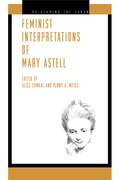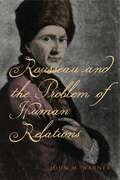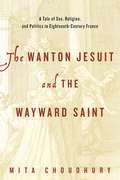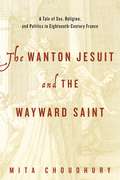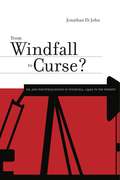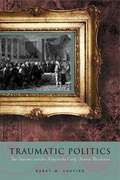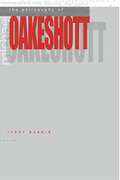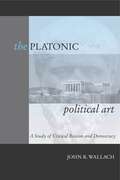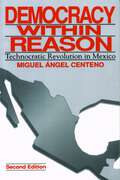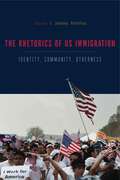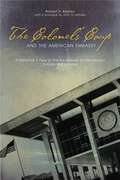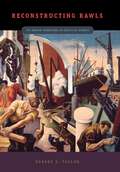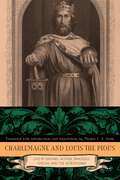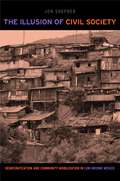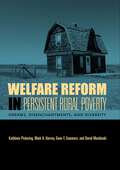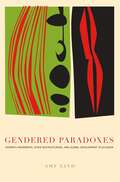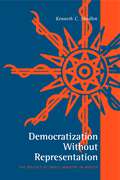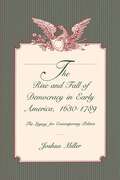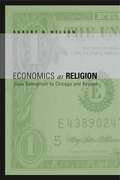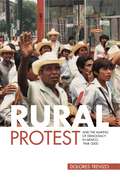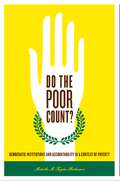- Table View
- List View
Feminist Interpretations of Mary Astell (Re-Reading the Canon)
by Penny A. Weiss Alice SowaalOften referred to as a proto-feminist, early modern English philosopher and rhetorician Mary Astell was a pious supporter of monarchy who wrote about gender equality at a time when society tightly constrained female agency. This diverse collection of essays situates her ideas in feminist, historical, and philosophical contexts. Focusing on Astell’s work and thought, this book explores the degree to which she can be considered a “feminist” in light of her adherence to Cartesianism, Christian theology, and Tory politics. The contributors explore the philosophical underpinnings of Astell’s outspoken advocacy for the autonomy and education of women; examine the intricacies underlying her theories of power, community, and female resistance to unlawful authority; and reveal the similarities between her own philosophy of gender and sexual politics and feminist theorizing today.A broad-ranging look at one of the most important female writers of the seventeenth and eighteenth centuries, this volume will be especially valuable to students and scholars of feminist history and philosophy and the early modern era.Aside from the editors, the contributors are Kathleen A. Ahearn, Jacqueline Broad, Karen Detlefsen, Susan Paterson Glover, Marcy P. Lascano, Elisabeth Hedrick Moser, Christine Mason Sutherland, and Nancy Tuana.
Rousseau and the Problem of Human Relations
by John M. WarnerIn this volume, John Warner grapples with one of Jean-Jacques Rousseau’s chief preoccupations: the problem of self-interest implicit in all social relationships. Not only did Rousseau never solve this problem, Warner argues, but he also believed it was fundamentally unsolvable—that social relationships could never restore wholeness to a self-interested human being.This engaging study is founded on two basic but important questions: what do we want out of human relationships, and are we able to achieve what we are after? Warner traces his answers through the contours of Rousseau’s thought on three distinct types of relationships—sexual love, friendship, and civil or political association—as well as alternate interpretations of Rousseau, such as that of the neo-Kantian Rawlsian school. The result is an insightful exploration of the way Rousseau inspires readers to imbue social relations with purpose and meaning, only to show the impossibility of reaching wholeness through such relationships.While Rousseau may raise our hopes only to dash them, Rousseau and the Problem of Human Relations demonstrates that his ambitious failure offers unexpected insight into the human condition and into the limits of Rousseau’s critical act.
The Wanton Jesuit and the Wayward Saint: A Tale of Sex, Religion, and Politics in Eighteenth-Century France (Refiguring Modernism Ser. #22)
by Mita ChoudhuryThis microhistory investigates the famous and scandalous 1731 trial in which Catherine Cadière, a young woman in the south of France, accused her Jesuit confessor, Jean-Baptiste Girard, of seduction, heresy, abortion, and bewitchment. Generally considered to be the last witchcraft trial in early modern France, the Cadière affair was central to the volatile politics of 1730s France, a time when magistrates and lawyers were seeking to contain clerical power. Mita Choudhury’s examination of the trial sheds light on two important phenomena with broad historical implications: the questioning of traditional authority and the growing disquiet about the role of the sacred and divine in French society. Both contributed to the French people’s ever-increasing disenchantment with the church and the king. Choudhury builds her story through an extensive examination of archival material, including trial records, pamphlets, periodicals, and unpublished correspondence from witnesses. The Wanton Jesuit and the Wayward Saint offers new insights into how the eighteenth-century public interpreted the accusations and why the case consumed the public for years, developing from a local sex scandal to a referendum on religious authority and its place in French society and politics.
The Wanton Jesuit and the Wayward Saint: A Tale of Sex, Religion, and Politics in Eighteenth-Century France
by Mita ChoudhuryThis microhistory investigates the famous and scandalous 1731 trial in which Catherine Cadière, a young woman in the south of France, accused her Jesuit confessor, Jean-Baptiste Girard, of seduction, heresy, abortion, and bewitchment. Generally considered to be the last witchcraft trial in early modern France, the Cadière affair was central to the volatile politics of 1730s France, a time when magistrates and lawyers were seeking to contain clerical power. Mita Choudhury’s examination of the trial sheds light on two important phenomena with broad historical implications: the questioning of traditional authority and the growing disquiet about the role of the sacred and divine in French society. Both contributed to the French people’s ever-increasing disenchantment with the church and the king. Choudhury builds her story through an extensive examination of archival material, including trial records, pamphlets, periodicals, and unpublished correspondence from witnesses. The Wanton Jesuit and the Wayward Saint offers new insights into how the eighteenth-century public interpreted the accusations and why the case consumed the public for years, developing from a local sex scandal to a referendum on religious authority and its place in French society and politics.
The Wanton Jesuit and the Wayward Saint: A Tale of Sex, Religion, and Politics in Eighteenth-Century France
by Mita ChoudhuryThis microhistory investigates the famous and scandalous 1731 trial in which Catherine Cadière, a young woman in the south of France, accused her Jesuit confessor, Jean-Baptiste Girard, of seduction, heresy, abortion, and bewitchment. Generally considered to be the last witchcraft trial in early modern France, the Cadière affair was central to the volatile politics of 1730s France, a time when magistrates and lawyers were seeking to contain clerical power. Mita Choudhury’s examination of the trial sheds light on two important phenomena with broad historical implications: the questioning of traditional authority and the growing disquiet about the role of the sacred and divine in French society. Both contributed to the French people’s ever-increasing disenchantment with the church and the king. Choudhury builds her story through an extensive examination of archival material, including trial records, pamphlets, periodicals, and unpublished correspondence from witnesses. The Wanton Jesuit and the Wayward Saint offers new insights into how the eighteenth-century public interpreted the accusations and why the case consumed the public for years, developing from a local sex scandal to a referendum on religious authority and its place in French society and politics.
From Windfall to Curse?: Oil and Industrialization in Venezuela, 1920 to the Present
by Jonathan Di JohnSince the discovery of abundant oil resources in the 1920s, Venezuela has had an economically privileged position among the nations of Latin America, which has led to its being treated by economic and political analysts as an exceptional case. In her well-known study of Venezuela’s political economy, The Paradox of Plenty (1997), Stanford political scientist Terry Karl argued that this oil wealth induced extraordinary corruption, rent-seeking, and centralized intervention that resulted in restricting productivity and growth. What this and other studies of Venezuela’s economy fail to explain, however, is how such conditions have accompanied both growth and stagnation at different periods of Venezuela’s history and why countries experiencing similar levels of corruption and rent-seeking produce divergent developmental outcomes. By investigating the record of economic development in Venezuela from 1920 to the present, Jonathan Di John shows that the key to explaining why the economy performed much better between 1920 and 1980 than in the post-1980 period is to understand how political strategies interacted with economic strategies—specifically, how politics determined state capacity at any given time and how the stage of development and development strategies affected the nature of political conflicts. In emphasizing the importance of an approach that looks at the political economy, not just at the economy alone, Di John advances the field methodologically while he contributes to a long-needed history of Venezuela’s economic performance in the twentieth century.
Traumatic Politics: The Deputies and the King in the Early French Revolution
by Barry M. ShapiroThe opening events of the French Revolution have stood as some of the most familiar in modern European history. Traumatic Politics emerges as a fresh voice from the existing historiography of this widely studied course of events. In applying a psychological lens to the classic problem of why the French Revolution’s first representative assembly was unable to reach a workable accommodation with Louis XVI, Barry Shapiro contends that some of the key political decisions made by the Constituent Assembly were, in large measure, the product of traumatic reactions to the threats to the lives of its members in the summer of 1789. As a result, Assembly policy frequently reflected a preoccupation with what had happened in the past rather than active engagement with present political realities. In arguing that the manner in which the Assembly dealt with the king bears the imprint of the behavior that typically follows exposure to traumatic events, Shapiro focuses on oscillating periods of traumatic repetition and traumatic denial. Highlighting the historical impact of what could be viewed as a relatively “mild” trauma, he suggests that trauma theory has a much wider field of potential applicability than that previously established by historians, who have generally confined themselves to studying the impact of massively traumatic events such as war and genocide. Moreover, in emphasizing the extent to which monarchical loyalties remained intact on the eve of the Revolution, this book also challenges the widely accepted contention that prerevolutionary cultural and discursive innovations had “desacralized” the king well before 1789.
The Philosophy of Michael Oakeshott (G - Reference, Information and Interdisciplinary Subjects)
by Terry NardinThis is the first comprehensive study of Michael Oakeshott as a philosopher rather than a political theorist, which is how most commentators have regarded him. Indeed, the careful reading of his published and unpublished writings that Terry Nardin provides here shows that Oakeshott's concerns have been primarily philosophical, not political. These writings go far beyond politics to offer a critical philosophy of human activity and of the disciplines that interpret and explain it. Oakeshott argues that inquiry can be independent of practical concerns, even when its subject is the thought and action of human beings.Although the book considers Oakeshott's views on morality, law, and government, it is primarily concerned with his ideas about the character of knowledge, especially knowledge of intelligent human conduct, and focuses attention on the concepts of modality, contingency, and civility that are central to Oakeshott's philosophy as a whole. Nardin seeks to show how Oakeshott's critique of scientism and other forms of foundationalism supports a powerful version of the argument that history is the proper mode for understanding human choice and action.The book thus provides the fullest discussion available of Oakeshott's antifoundationalist view of epistemology, metaphysics, and the philosophy of history and the human sciences. It examines his arguments concerning the criteria of truth, the forms of knowledge, the relationship between theory and practice, the place of interpretation in the social sciences, the nature and importance of historical explanation, and the definition of philosophy itself. And it is the first study to look at Oakeshott's relationship to phenomenology, hermeneutics, and other movements in twentieth-century Continental philosophy.
The Platonic Political Art: A Study of Critical Reason and Democracy (G - Reference, Information and Interdisciplinary Subjects)
by John R. WallachIn this first comprehensive treatment of Plato’s political thought in a long time, John Wallach offers a "critical historicist" interpretation of Plato. Wallach shows how Plato’s theory, while a radical critique of the conventional ethical and political practice of his own era, can be seen as having the potential for contributing to democratic discourse about ethics and politics today.The author argues that Plato articulates and "solves" his Socratic Problem in his various dialogues in different but potentially complementary ways. The book effectively extracts Plato from the straightjacket of Platonism and from the interpretive perspectives of the past fifty years—principally those of Karl Popper, Leo Strauss, Hannah Arendt, M. I. Finley, Jacques Derrida, and Gregory Vlastos.The author’s distinctive approach for understanding Plato—and, he argues, for the history of political theory in general—can inform contemporary theorizing about democracy, opening pathways for criticizing democracy on behalf of virtue, justice, and democracy itself.
Democracy Within Reason: Technocratic Revolution in Mexico
by Miguel Angel CentenoDuring the 1980s the Mexican regime faced a series of economic, social, and political disasters that led many to question its survival. Yet by 1992 the economy was again growing, with inflation under control and the confidence of international investors restored. Mexico was now touted as an example for regimes in Eastern Europe to emulate.How did Carlos Salinas and his team of technocrats manage to gain political power sufficient to impose their economic model? How did they sustain their revolution from above despite the hardships these changes brought for many Mexicans? How did they stage their remarkable political comeback and create their “democracy within reason”? Why did Salinas succeed in keeping control of his revolution while Mikhail Gorbachev failed to do so in his similar effort at radical reform?Miguel Centeno addresses these questions by analyzing three critical developments in the Mexican state: the centralization of power within the bureaucracy; the rise of a new generation of technocrats and their use of a complex system of political networks; and the dominance of a neoliberal ideology and technocratic vision that guided policy decisions and limited democratic participation. In his conclusion the author proposes some alternative scenarios for Mexico’s future, including the role of NAFTA, and suggests lessons for the study of regimes undertaking similar transitions.Of obvious interest to students of contemporary Mexico and Latin America, the book will also be very useful for those analyzing the transition to the market in other countries, the role of knowledge in public policy, and the nature of the modern state in general.
The Rhetorics of US Immigration: Identity, Community, Otherness
by E. Johanna HarteliusIn the current geopolitical climate—in which unaccompanied children cross the border in record numbers, and debates on the topic swing violently from pole to pole—the subject of immigration demands innovative inquiry. In The Rhetorics of US Immigration, some of the most prominent and prolific scholars in immigration studies come together to discuss the many facets of immigration rhetoric in the United States.The Rhetorics of US Immigration provides readers with an integrated sense of the rhetorical multiplicity circulating among and about immigrants. Whereas extant literature on immigration rhetoric tends to focus on the media, this work extends the conversation to the immigrants themselves, among others. A collection whose own eclecticism highlights the complexity of the issue, The Rhetorics of US Immigration is not only a study in the language of immigration but also a frank discussion of who is doing the talking and what it means for the future.From questions of activism, authority, and citizenship to the influence of Hollywood, the LGBTQ community, and the church, The Rhetorics of US Immigration considers the myriad venues in which the American immigration question emerges—and the interpretive framework suited to account for it.Along with the editor, the contributors are Claudia Anguiano, Karma R. Chávez, Terence Check, Jay P. Childers, J. David Cisneros, Lisa M. Corrigan, D. Robert DeChaine, Anne Teresa Demo, Dina Gavrilos, Emily Ironside, Christine Jasken, Yazmin Lazcano-Pry, Michael Lechuga, and Alessandra B. Von Burg.
The Colonels’ Coup and the American Embassy: A Diplomat’s View of the Breakdown of Democracy in Cold War Greece (ADST-DACOR Diplomats and Diplomacy Series)
by John O. Iatrides Robert V. KeeleyRobert Keeley was a Foreign Service officer stationed in Greece during one of the most tumultuous events in the country’s history, the so-called Colonels’ coup of April 21, 1967. This is his insider’s account of how U.S. policy was formulated, debated, and implemented from 1966 to 1969, the critical years directly before and after the coup. A major event in the history of the Cold War, the coup ushered in a seven-year period of military rule in Greece. In its wake, some eight thousand people affiliated with the Communist Party were rounded up, and Greece became yet another country where the fear of Communism led the United States into alliance with a repressive right-wing authoritarian regime. In military coups in some other countries, it is known that the CIA and other agencies of the U.S. government played an active role in encouraging and facilitating the takeover. The Colonels’ coup, however, came as a surprise to the United States (which was expecting a Generals’ coup instead). Yet the U.S. government accepted it after the fact, despite internal disputes within policymaking circles about the wisdom of accommodating the upstart Papadopoulos regime. Keeley was among those dissenters.
Reconstructing Rawls: The Kantian Foundations of Justice as Fairness
by Robert S. TaylorReconstructing Rawls has one overarching goal: to reclaim Rawls for the Enlightenment—more specifically, the Prussian Enlightenment. Rawls’s so-called political turn in the 1980s, motivated by a newfound interest in pluralism and the accommodation of difference, has been unhealthy for autonomy-based liberalism and has led liberalism more broadly toward cultural relativism, be it in the guise of liberal multiculturalism or critiques of cosmopolitan distributive-justice theories. Robert Taylor believes that it is time to redeem A Theory of Justice’s implicit promise of a universalistic, comprehensive Kantian liberalism. Reconstructing Rawls on Kantian foundations leads to some unorthodox conclusions about justice as fairness, to be sure: for example, it yields a more civic-humanist reading of the priority of political liberty, a more Marxist reading of the priority of fair equality of opportunity, and a more ascetic or antimaterialist reading of the difference principle. It nonetheless leaves us with a theory that is still recognizably Rawlsian and reveals a previously untraveled road out of Theory—a road very different from the one Rawls himself ultimately followed.
Charlemagne and Louis the Pious: Lives by Einhard, Notker, Ermoldus, Thegan, and the Astronomer
by Thomas F. NobleCarolingian historical texts have long stood at the base of our modern knowledge about the eighth and ninth centuries. The ninth century gave birth to a new revival of secular biography, which has come to be recognized as one of the brightest bands in the spectrum of Carolingian historical writing. This collection brings together, for the first time in one volume, the five royal/imperial biographies written during the Carolingian period.Thomas F. X. Noble’s new English translations of these five important texts—Einhard’s Life of Emperor Charles, Notker’s Deeds of Charles the Great, Ermoldus Nigellus’s Poem in Honor of Louis, Thegan’s Deeds of Emperor Louis, and the Life of Louis by “the Astronomer”—are each accompanied by a short introduction and a note on “Essential Reading.” Offering details on matters of style, sources used by the author, and the influence, if any, exerted by the text, Noble provides a context for each translation without compromising the author’s intended voice. By “reuniting” these five essential medieval texts in an English translation, this volume makes these voices accessible to scholars and non-experts alike throughout the Anglophone world.
Canon Fodder: Historical Women Political Thinkers
by Penny A. WeissThis book is an exercise in the recovery of historical memory about a set of thinkers who have been forgotten or purposely ignored and, as a result, never made it into the canon of Western political philosophy. Penny Weiss calls them “canon fodder,” recalling the fate of soldiers in war who are treated by their governments and military leaders as expendable. Despite some real progress at recovery over the past few decades, and the now-frequent references to a few female thinkers like Mary Wollstonecraft, Hannah Arendt, and Simone de Beauvoir, the surface has only been scratched, and the rich resources of women’s writings about political ideas remain still largely untapped. Included here, and intended to further whet the palate, are figures from Sei Shōnagon, Christine de Pizan, and Mary Astell to Elizabeth Cady Stanton, Anna Julia Cooper, and Emma Goldman. Restoring female thinkers to the conversation of political philosophy is the primary goal of this book. Part I deploys a range of these thinkers to discuss the nature of political inquiry itself. Part II focuses on alternative approaches to and visions of core political ideas: equality, power, revolution, childhood, and community. While mainly an intellectual act of revival, this book also affects practical political life, because “remote and academic as they sometimes appear, debates about what to include in the canon ultimately touch almost everyone: students handed texts from lists of ‘great books’ to guide them . . . and citizens whose governments justify their actions with ideas from political texts deemed classic."
The Illusion of Civil Society: Democratization and Community Mobilization in Low-Income Mexico
by Jon ShefnerMuch has been written about how civil society challenges authoritarian governments and helps lead the way to democratization. These studies show that neoliberal economic policies have harmed many sectors of society, weakening the state and undermining clientelistic relationships that previously provided material benefits to middle- and low-income citizens, who are then motivated to organize coalitions to work for greater social justice and equality. Recognizing this important role played by civil society organizations, Jon Shefner goes further and analyzes the variegated nature of the interests represented in these coalitions, arguing that the differences among civil society actors are at least as important as their similarities in explaining how they function and what success, or lack thereof, they have experienced. Through an ethnographic examination extending over a decade, Shefner tells the story of how a poor community on the urban fringe of Guadalajara mobilized through an organization called the Unión de Colonos Independientes (UCI) to work for economic improvement with the support of Jesuits inspired by liberation theology. Yet Mexico’s successful formal democratic transition, won with the elections in 2000, was followed by the dissolution of the coalition. Neither political access for the urban poor, nor their material well-being, has increased with democratization. The unity and even the concept of civil society has thus turned out to be an illusion.
Welfare Reform in Persistent Rural Poverty: Dreams, Disenchantments, and Diversity (Rural Studies)
by Kathleen Pickering Mark H. Harvey Gene F. Summers David MushinskiSince the Personal Responsibility and Work Opportunity Reconciliation Act of 1996 was enacted, policy makers, agency administrators, community activists, and academics from a broad range of disciplines have debated and researched the implications of welfare reform in the United States. Most of the attention, however, has focused on urban rather than rural America. Welfare Reform in Persistent Rural Poverty examines welfare participants who live in chronically poor rural areas of the United States where there are few job opportunities and poor systems of education, transportation, and child care. Kathleen Pickering and her colleagues look at welfare reform as it has been experienced in four rural and impoverished regions of the United States: American Indian reservations in South Dakota, the Rio Grande region, Appalachian Kentucky, and the Mississippi Delta. Throughout these areas the rhetoric of reform created expectations of new opportunities to find decent work and receive education and training. In fact, these expectations have largely gone unfulfilled as welfare reform has failed to penetrate poor areas where low-income families remain isolated from the economic and social mainstream of American society. Welfare Reform in Persistent Rural Poverty sheds welcome light on the opportunities and challenges that welfare reform has imposed on low-income families situated in disadvantaged areas. Combining both qualitative and quantitative research, it will be an excellent guide for scholars and practitioners alike seeking to address the problem of poverty in rural America.
Gendered Paradoxes: Women's Movements, State Restructuring, and Global Development in Ecuador (G - Reference, Information and Interdisciplinary Subjects)
by Amy LindSince the early 1980s Ecuador has experienced a series of events unparalleled in its history. Its “free market” strategies exacerbated the debt crisis, and in response new forms of social movement organizing arose among the country’s poor, including women’s groups. Gendered Paradoxes focuses on women’s participation in the political and economic restructuring process of the past twenty-five years, showing how in their daily struggle for survival Ecuadorian women have both reinforced and embraced the neoliberal model yet also challenged its exclusionary nature. Drawing on her extensive ethnographic fieldwork and employing an approach combining political economy and cultural politics, Amy Lind charts the growth of several strands of women’s activism and identifies how they have helped redefine, often in contradictory ways, the real and imagined boundaries of neoliberal development discourse and practice. In her analysis of this ambivalent and “unfinished” cultural project of modernity in the Andes, she examines state policies and their effects on women of various social sectors; women’s community development initiatives and responses to the debt crisis; and the roles played by feminist “issue networks” in reshaping national and international policy agendas in Ecuador and in developing a transnationally influenced, locally based feminist movement.
Gendered Paradoxes: Women's Movements, State Restructuring, and Global Development in Ecuador
by Amy LindSince the early 1980s Ecuador has experienced a series of events unparalleled in its history. Its “free market” strategies exacerbated the debt crisis, and in response new forms of social movement organizing arose among the country’s poor, including women’s groups. Gendered Paradoxes focuses on women’s participation in the political and economic restructuring process of the past twenty-five years, showing how in their daily struggle for survival Ecuadorian women have both reinforced and embraced the neoliberal model yet also challenged its exclusionary nature. Drawing on her extensive ethnographic fieldwork and employing an approach combining political economy and cultural politics, Amy Lind charts the growth of several strands of women’s activism and identifies how they have helped redefine, often in contradictory ways, the real and imagined boundaries of neoliberal development discourse and practice. In her analysis of this ambivalent and “unfinished” cultural project of modernity in the Andes, she examines state policies and their effects on women of various social sectors; women’s community development initiatives and responses to the debt crisis; and the roles played by feminist “issue networks” in reshaping national and international policy agendas in Ecuador and in developing a transnationally influenced, locally based feminist movement.
Democratization Without Representation: The Politics of Small Industry in Mexico (G - Reference, Information and Interdisciplinary Subjects)
by Kenneth C. ShadlenWhen countries become more democratic, new opportunities arise for individuals and groups to participate in politics and influence the making of policy. But democratization does not ensure better representation for everyone, and indeed some sectors of society are ill-equipped to take advantage of these new opportunities. Small industry in Mexico, Kenneth Shadlen shows, is an excellent example of a sector whose representation decreased during democratization. Shadlen’s analysis focuses on the basic characteristics of small firms that complicate the process of securing representation in both authoritarian and democratic environments. He then shows how increased pluralism and electoral competition served to exacerbate the political problems facing the sector during the course of democratization in Mexico. These characteristics created problems for small firms both in acting collectively through interest associations and civil society organizations and in wielding power within political parties. The changes that democratization effected in the structure of corporatism put small industry at a significant disadvantage in the policy-making arena even while there was general agreement on the crucial importance of this sector in the new neoliberal economy, especially for generating employment. The final chapter extends the analysis by making comparisons with the experience of small industry representation in Argentina and Brazil.Shadlen uses extensive interviews and archival research to provide new evidence and insights on the difficult challenges of interest aggregation and representation for small industry. He conducted interviews with a wide range of owners and managers of small firms, state and party officials, and leaders of business associations and civil society organizations. He also did research at the National Archives in Mexico City and in the archives of the most important business organizations for small industry in the post-World War II period.
The Rise and Fall of Democracy in Early America, 1630–1789: The Legacy for Contemporary Politics (G - Reference, Information and Interdisciplinary Subjects)
by Joshua MillerThe Rise and Fall of Democracy in Early America describes and explores the emergence of a directly democratic political culture in America, the Federalists' theoretical campaign against that culture, and the legacy of the struggle over democracy for politics today. The Rise and Fall of Democracy in Early America traces the rise of democracy in America beginning with the Puritans of New England; the radicalization during the eighteenth century of Puritan notions of community, autonomy, and participation; and the Antifederalist attempt to preserve a democratic political culture in the face of Federalist efforts to centralize power and distance it from the people by the passage of the 1787 Constitution.Despite its historical concerns, this book is not a history of institutions or a history of ideas. It is a work of political theory that explores certain early American texts and debates, and discusses the theoretical questions raised by those texts and debates, emphasizing those issues most relevant to democratic thought in our own time. Among the many insights into our democratic heritage that Joshua Miller affords us in his discussion of the Puritan theory of membership and the Antifederalist theory of autonomous communities is the hitherto obscured affinity between democracy and conservatism.Whereas many treatments of early American political thought make the debate over the ratification of the Constitution appear dry and abstract, this book shows the clash of political values and ideals that were at the heart of the struggle. It illustrates how the Federalists employed a democratic-sounding vocabulary to cloak their centralizing, elitist designs.Miller introduces readers to a political theory of direct democracy that is presented as an alternative to Marxism, liberalism, and mainstream conservatism. This new democratic theory based on an early American political tradition should serve as a stimulus for rethinking the directions we are taking in politics today.
Economics as Religion: From Samuelson to Chicago and Beyond
by Robert H. NelsonIn this study, Robert H. Nelson explores the genesis, the prophets, the prophesies, and the tenets of what he sees as a religion of economics that has come into full blossom in latter-day America. Nelson does not see "theology" as a bad word, and his examination of the theology underlying Samuelsonian and Chicagoan economics is not a put-down. It is a way of seeing the rhetoric of fundamental belief—what has been called "vision."
Rural Protest and the Making of Democracy in Mexico, 1968–2000
by Dolores TrevizoWhen the PRI fell from power in the elections of 2000, scholars looked for an explanation. Some focused on international pressures, while others pointed to recent electoral reforms. In contrast, Dolores Trevizo argues that a more complete explanation takes much earlier democratizing changes in civil society into account. Her book explores how largely rural protest movements laid the groundwork for liberalization of the electoral arena and the consolidation of support for two opposition parties, the PAN on the right and the PRD on the left, that eventually mounted a serious challenge to the PRI. She shows how youth radicalized by the 1968 showdown between the state and students in Mexico City joined forces with peasant militants in nonviolent rural protest to help bring about needed reform in the political system. In response to this political effervescence in the countryside, agribusinessmen organized in peak associations that functioned like a radical social movement. Their countermovement formulated the ideology of neoliberalism, and they were ultimately successful in mobilizing support for the PAN. Together, social movements and the opposition parties nurtured by them contributed to Mexico’s transformation from a one-party state into a real electoral democracy nearly a hundred years after the Revolution.
Rural Protest and the Making of Democracy in Mexico, 1968–2000
by Dolores TrevizoWhen the PRI fell from power in the elections of 2000, scholars looked for an explanation. Some focused on international pressures, while others pointed to recent electoral reforms. In contrast, Dolores Trevizo argues that a more complete explanation takes much earlier democratizing changes in civil society into account. Her book explores how largely rural protest movements laid the groundwork for liberalization of the electoral arena and the consolidation of support for two opposition parties, the PAN on the right and the PRD on the left, that eventually mounted a serious challenge to the PRI. She shows how youth radicalized by the 1968 showdown between the state and students in Mexico City joined forces with peasant militants in nonviolent rural protest to help bring about needed reform in the political system. In response to this political effervescence in the countryside, agribusinessmen organized in peak associations that functioned like a radical social movement. Their countermovement formulated the ideology of neoliberalism, and they were ultimately successful in mobilizing support for the PAN. Together, social movements and the opposition parties nurtured by them contributed to Mexico’s transformation from a one-party state into a real electoral democracy nearly a hundred years after the Revolution.
Do the Poor Count?: Democratic Institutions and Accountability in a Context of Poverty (G - Reference, Information and Interdisciplinary Subjects)
by Michelle M. Taylor-RobinsonLatin America’s flirtation with neoliberal economic restructuring in the 1980s and 1990s (the so-called Washington Consensus strategy) had the effect of increasing income inequality throughout the region. The aim of this economic policy was in part to create the conditions for stable democracy by ensuring efficient economic use of resources, both human and capital, but the widening gap between rich and poor threatened to undermine political stability. At the heart of the dilemma faced by these new democracies is the question of accountability: Are all citizens equally capable of holding the government accountable if it does not represent their interests? In this book, Michelle Taylor-Robinson investigates both the formal institutions of democracy (such as electoral rules and the design of the legislative and executive branches) and informal institutions (such as the nomination procedures of political parties and patron-client relationships) to see what incentives legislators have to pay attention to the needs of poor people and thereby adequately represent their interests.
